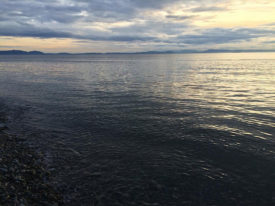 Surely one of the most encouraging conservation stories in recent years has been the phenomenal revival of wild wolves in the Rockies. Less well-known is that wolves are also returning to Oregon and Washington. Their future on the West Coast, however, remains highly uncertain.
Surely one of the most encouraging conservation stories in recent years has been the phenomenal revival of wild wolves in the Rockies. Less well-known is that wolves are also returning to Oregon and Washington. Their future on the West Coast, however, remains highly uncertain.
While Oregon and Washington are more politically progressive than the wolf strongholds in the Rockies—Idaho, Montana, and Wyoming — the truth is that there is not much reason to be optimistic for their prospects without good conservation policy. Toward that end, Oregon already has a wolf management plan in place, but Washington is just now drafting its own state plan.
Washington is considering four policy options for managing wolves. Somewhat bizarrely, the future of this endangered species—which you might think would depend largely on science—in fact depends greatly on public opinion. So if you’re part of the public and you have an opinion, it might be a good to share your thoughts with your public officials.
Here are the remaining hearings:
Mon, Nov. 2, Seattle: REI flagship store, 222 Yale Ave N
Wed, Nov. 4, Mt. Vernon: 2300 Market St., Cottontree Inn Convention Center
Thu, Nov. 5, Sequim: 212 Blake Ave., Guy Cole Conv. Ctr., Carrie Blake Park
Mon, Nov. 9, Omak: 175 Rodeo Trail Road, Okanogan Co. Fairgrounds Agri-plex
Tue, Nov. 10, Wenatchee: 327 N. Wenatchee Ave., Chelan Co. PUD Auditorium
All hearings 6:30-9:00 p.m.
For background reading, here’s Washington’s draft wolf management plan; some excellent context from Conservation Northwest; and a first-rate website called Western Wolves. And if that’s not enough, you can go read everything I’ve written about wolves in Washington. Have fun.
Photo by Gary Kramer, USFWS.









Ken Fischman, Ph.D.
I testified at the Spokane Valley meeting last Tuesday. Two thirds of those who spoke, favored wolf recovery. However, the only media who covered the event, was an Ag newspaper, who predictably only quoted anti-wolf ranchers.If you intend to testify, first call you local media and ask them to cover the meeting. If a tree falls in the woods, and there is no one to witness it, did it make a noise?
Barbara Christensen, Conservation Northwest
Thank you, Ken, for testifying, and Eric, for spreading the word! Personally, the important role wolves play in the ecosystem is reason enough to want their full recovery in the state. When prey animals are forced to actually act like prey animals, the riparian recovery can be astounding (http://conservationnw.org/scat/wolves-influence-forest-diversity).